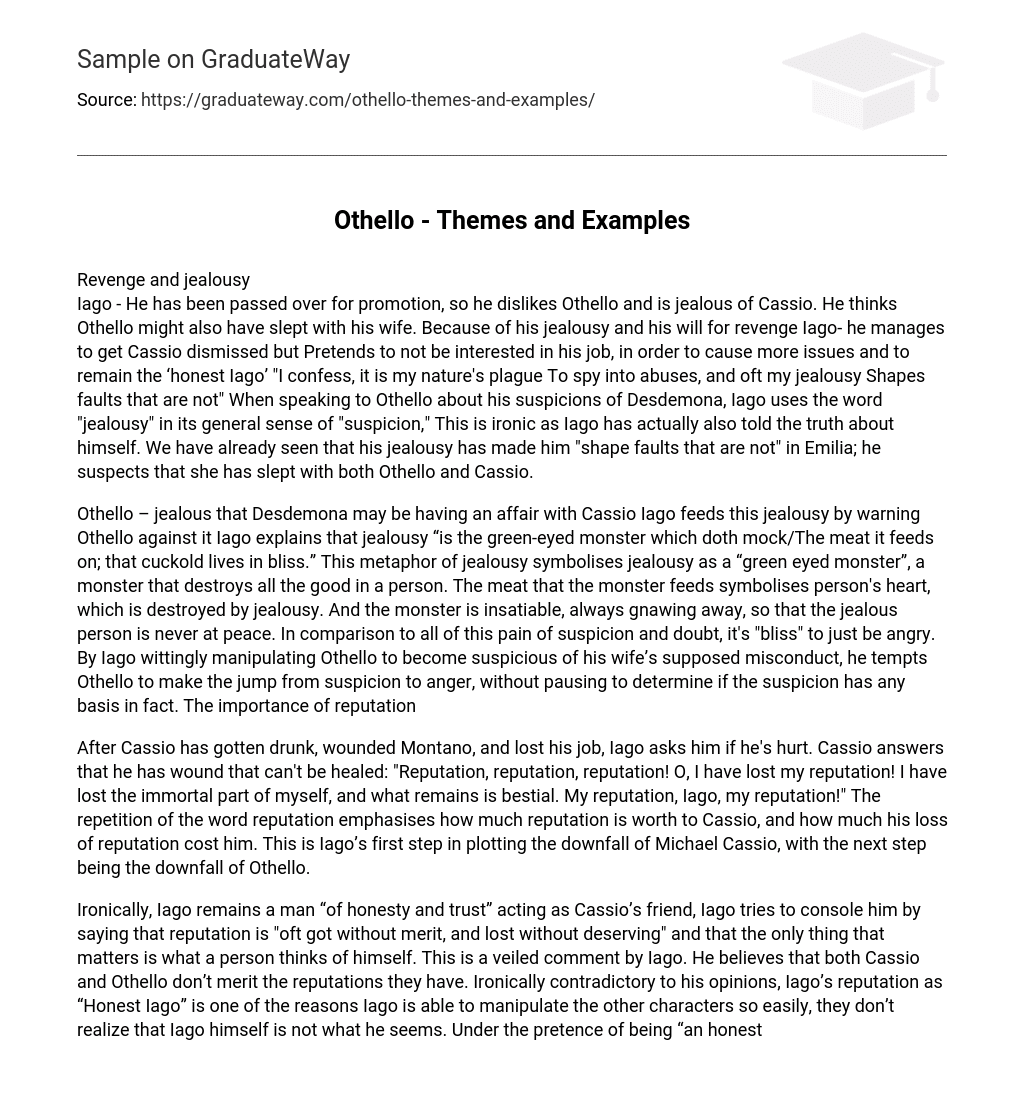Revenge and jealousy
Iago – He has been passed over for promotion, so he dislikes Othello and is jealous of Cassio. He thinks Othello might also have slept with his wife. Because of his jealousy and his will for revenge Iago- he manages to get Cassio dismissed but Pretends to not be interested in his job, in order to cause more issues and to remain the ‘honest Iago’ “I confess, it is my nature’s plague To spy into abuses, and oft my jealousy Shapes faults that are not” When speaking to Othello about his suspicions of Desdemona, Iago uses the word “jealousy” in its general sense of “suspicion,” This is ironic as Iago has actually also told the truth about himself. We have already seen that his jealousy has made him “shape faults that are not” in Emilia; he suspects that she has slept with both Othello and Cassio.
Othello – jealous that Desdemona may be having an affair with Cassio Iago feeds this jealousy by warning Othello against it Iago explains that jealousy “is the green-eyed monster which doth mock/The meat it feeds on; that cuckold lives in bliss.” This metaphor of jealousy symbolises jealousy as a “green eyed monster”, a monster that destroys all the good in a person. The meat that the monster feeds symbolises person’s heart, which is destroyed by jealousy. And the monster is insatiable, always gnawing away, so that the jealous person is never at peace. In comparison to all of this pain of suspicion and doubt, it’s “bliss” to just be angry. By Iago wittingly manipulating Othello to become suspicious of his wife’s supposed misconduct, he tempts Othello to make the jump from suspicion to anger, without pausing to determine if the suspicion has any basis in fact. The importance of reputation
After Cassio has gotten drunk, wounded Montano, and lost his job, Iago asks him if he’s hurt. Cassio answers that he has wound that can’t be healed: “Reputation, reputation, reputation! O, I have lost my reputation! I have lost the immortal part of myself, and what remains is bestial. My reputation, Iago, my reputation!” The repetition of the word reputation emphasises how much reputation is worth to Cassio, and how much his loss of reputation cost him. This is Iago’s first step in plotting the downfall of Michael Cassio, with the next step being the downfall of Othello.
Ironically, Iago remains a man “of honesty and trust” acting as Cassio’s friend, Iago tries to console him by saying that reputation is “oft got without merit, and lost without deserving” and that the only thing that matters is what a person thinks of himself. This is a veiled comment by Iago. He believes that both Cassio and Othello don’t merit the reputations they have. Ironically contradictory to his opinions, Iago’s reputation as “Honest Iago” is one of the reasons Iago is able to manipulate the other characters so easily, they don’t realize that Iago himself is not what he seems. Under the pretence of being “an honest fellow” Iago craftily leads Othello into thinking Cassio had an affair with Desdemona, by pretending to be extremely reluctant to say anything bad about anyone. As part of this pretence, Iago says that he wouldn’t want to harm anyone’s reputation, because a reputation is precious “Good name in man and woman, dear my lord, is the immediate jewel of their souls.” Of course these moralistic thoughts that reputation is the jewel of souls, is in stark contrast to what Iago said to Cassio about reputation. Iago told Cassio that reputation was worthless in order to make Cassio forget his sense of shame and approach Desdemona about getting his job back. Now Iago tells Othello that “good name” is of immense worth, not to protect anyone’s reputation, but to plant the idea that Othello is in danger of losing his own good name.
Manipulation and Deception
Iago’s manipulated other characters by pretending to be “Honest Iago.” Iago believed that by demonstrating outwardly what he feels inwardly, he will make himself most vulnerable. Iago states that he would never “wear my heart upon my sleeve for daws to peck at” as showing how he truly feels to others would tear him apart instantly. Iago also exclaims “I am not what I am” this is dramatic irony because it demonstrates to the audience how Iago will manipulate and deceive everyone in the near future. This juxtaposes what others think of him, they believe “An honest man he is, and hates the slime that sticks on filthy deeds.” This metaphor is ironic, because throughout the entire play Iago manipulates other characters to do as he wills by deceiving them into believing that he is an honest man. Iago continually manipulates other characters by playing on their weaknesses.
This is demonstrated when Iago convinces Cassio to drink alcohol because he knows it will cause him to lose his dignity. “I’ll have our Michael Cassio on the hip” Iago uses this hunting metaphor to demonstrate how once he uses Cassio’s weaknesses against him, he will have Cassio at his mercy. When Othello arrived when Cassio was drunk and assessed the situation he asked Iago what happened. When Iago was explaining to Othello what happened later on that evening Iago says “I had rather have this tongue cut from my mouth than it should do offence to Michael Cassio. Yet, I persuade myself, to speak the truth” Iago uses a hyperbole as deliberate exaggeration for the effect of manipulating and deceiving the other characters. Iago pretends that he doesn’t wish to cause harm to Cassio, to uphold his reputation as “Honest Iago.”





